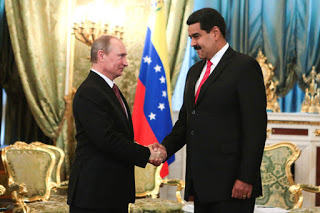Venezuela Political Crisis: Russia Offers to “Mediate”

Contrary to the Alt-Media Community’s “wishful thinking” expectations that Russia would “pull a Syria” in Venezuela by commencing a full-on military intervention in support of the country’s democratically elected and legitimate government, Moscow instead decided to channel the diplomatic dimension of that Mideast campaign by offering to “mediate” between the authorities and “responsible” members of the “opposition”.
The Hybrid War on Venezuela unprecedentedly escalated earlier this week when Juan Guaidó proclaimed himself “president” and was recognized by the US and many of its allies as such, pushing the Bolivarian Republic to the brink of civil war and raising fears that a multilateral military invasion might be imminent. Amidst this uncertain situation, Russia spoke out very strongly against the US’ violation of international law and meddling in Venezuela’s internal affairs, raising hopes among many in the Alt-Media Community that Moscow might be mulling a repeat of the Syrian scenario by commencing a full-on military intervention in support of the country’s democratically elected and legitimate government.
Much to their surprise, however, what Russia seems to have had in mind in that respect was only the diplomatic dimension of that Mideast campaign after it swiftly suggested that it could “mediate” between the authorities and “responsible” members of the “opposition” just like it’s been doing between Damascus and the Arab Republic’s so-called “moderate opposition”. In fact, when President Putin spoke to his Venezuelan counterpart, Kremlin spokesman Dmitry Peskov confirmed that they didn’t even discuss the possibility of Russia extending financial or military assistance to its partner. This follow’s President Putin and Deputy Foreign Minister Sergey Ryabkov’s earlier call for a “peaceful dialogue” to end the crisis.
Moving beyond Russia’s principled stance in publicly defending international law and condemning the US’ violation thereof, the country’s real interests in Venezuela lay in ensuring that its partner repays its billions of dollars in loans and respects the energy and military deals that it previously agreed to. Seeing as how the US-backed “opposition” would probably render those deals null and void if they successfully seizes power and consequently inflict a serious financial blow to sanctions-beleaguered Russia, Moscow has a natural interest in trying to “get on their good side” and “peacefully facilitate” a possible “leadership transition” per its “balancing” strategy if it’s concluded that such a scenario is “inevitable”.
It does indeed seem as though Russia might be countenancing such an outcome considering that President Putin somewhat surprisingly didn’t think it appropriate to discuss dispatching emergency financial and military aid to Maduro, possibly believing that it might be all for naught if Moscow received intelligence about the US’ next planned moves in the Hybrid War and didn’t want to risk deepening its potential loss if the “opposition” was about to make a major move that might successfully lead to the government’s overthrow. That possibly being the case, it makes sense why Russia would want to “mediate” between Maduro and the “opposition” as soon as possible to hopefully “hedge its losses”.
To clarify for anyone who might be confused by this sudden turn of events and unexpected application of the Syrian scenario, Russia is a capitalist country that’s focused first and foremost on protecting its own interests before anyone else’s, and it’s not going to sacrifice its soldiers’ lives to uphold Venezuela’s socialist system. It appreciates the country’s multipolar orientation but couldn’t protect its partner (and most importantly, its assets) even if it wanted to because it can’t secure the trans-Atlantic supply lines necessary to do so. There’s also no geopolitical incentive of becoming the regional kingmaker like it did in the Mideast with Syria to justify such a risky operation anyhow.
Simply put, Russia’s billions of dollars’ worth of assets and contracts are indefensible if the country succumbs to the rolling US-backed coup attempt, which is why Moscow is so motivated to “mediate” between the two domestic parties of the conflict just two days after the latest Hybrid War escalation. Venezuela’s located half a world away from Russia whereas Syria is within comparatively closer proximity and not as difficult to sustain with emergency arms shipments and Moscow’s ultimate military intervention, though as can be seen, the Syrian scenario is nevertheless still being applied in Venezuela through Russia’s efforts to “balance” between the democratically elected and legitimate government & the “moderate opposition”.
*
Note to readers: please click the share buttons above. Forward this article to your email lists. Crosspost on your blog site, internet forums. etc.
This article was originally published on Eurasia Future.
Andrew Korybko is an American Moscow-based political analyst specializing in the relationship between the US strategy in Afro-Eurasia, China’s One Belt One Road global vision of New Silk Road connectivity, and Hybrid Warfare. He is a frequent contributor to Global Research.

